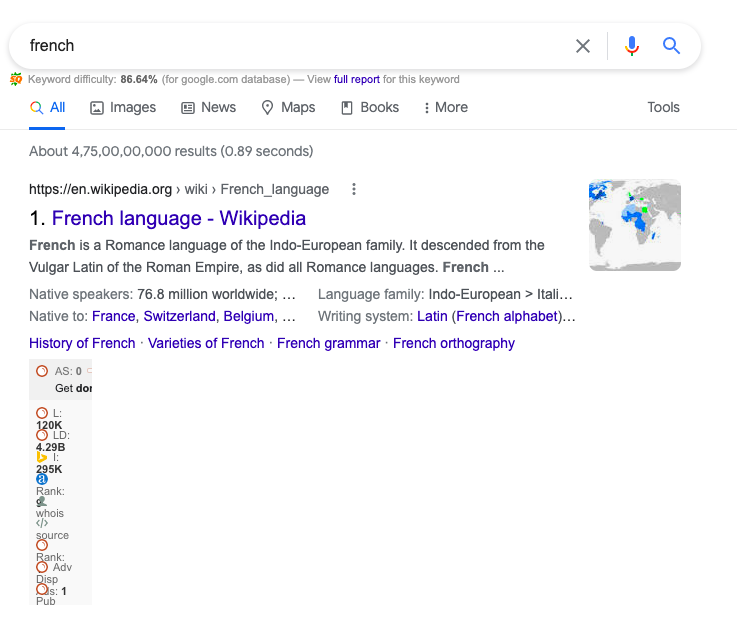SEO entity is a new concept full of opportunities, where solid approaches still need development. This process includes the techniques, tools, and theory to use entities and optimize your website. If you hear the term “SEO entity” or have any confusion, you will get to learn in detail about that. When you avail of professional SEO services, you make the perfect use of them.
You can find numerous articles posted on entities online and their role in web indexing evolution. Still, many business owners find it difficult to understand clearly. They don’t know how to use entities to boost website performance.
This guide outlines what is an SEO entity, how Google uses entities, and how to use entities to improve your SEO. Here you will also learn why you require entities to increase the effectiveness of your SEO efforts and strengthen your website framework and traffic acquisition methods.
Keep reading.
Keywords Vs Entity
What are Keywords?
Keywords are undoubtedly the most important part of any SEO campaign. Without them, your site will not rank and you could miss out on a lot of traffic! These are the words or phrases that a user enters in the search box of a search engine.
The goal of the keywords is to make sure that your page appears as high in search results for one or more phrases.
What are Entities? As Google defines, it’s “A thing or concept that is singular, unique, well-defined and distinguishable.” An entity doesn’t have to be a tangible object, it can be an idea, a fragrance and so on.
What is an SEO Entity?
SEO is the process to boost the quantity and quality of traffic to your website via search engine results. SEO processes, since their emergence, have always been focused mainly on keywords to drive traffic.
While an SEO entity is all about focussing on entities rather than only keywords. It’s quite a simple process but needs a fundamental mindset development.
So, what is a keyword? In SEO, a keyword consists of a single or more word entered by users in search engines, such as Google and Bing. When search engines came into the scene, the concept of keywords has created the foundation of natural referencing techniques with the motive to ensure your website visibility in SERPs for one or multiple certain phrases.
Here are the two key features of keywords:
Ambiguity
A keyword may refer to diverse subjects. For instance, the keyword “cookie” may refer to an edible biscuit or information sent by a web server when a web page loads.
Language-specific
A keyword is specific to a language most of the time. For instance, the keyword “lavadora” in Spanish corresponds to “machine a laver” in French and “washing machine” in English.
Now, let’s discuss clearly what an entity is.
Generally, an entity is a single and well-explained concept of a thing that you can link to a knowledge graph.
A keyword is only a collection of letters specific to a language. While, an entity is meaningful, independent of the language and synonymous keywords that designate it.
In the SEO sphere, an entity is any subject that you can link to the knowledge graphs of search engines, like the Google Knowledge Graph.
Wikipedia has acted as a basic, reliable seed set for the Knowledge Graph. To be precise, an entity is any subject that you can attach to a Wikipedia article page rather than category or disambiguation pages. To optimize your on-site and on-page SEO, you must be focussing on which fundamental entities to use for helping a search engine understand the inherent meaning of the website content.
You can use other kinds of entities, such as you, your company, and your brand, which you can link to other Knowledge Graphs(such as Linkedin and Google My Business) while not having Wikipedia pages. But, optimizing these entities will only boost your reputation but not SEO.
But before using entities, you should know the main advantages of implementing them.
Key Benefits of Entity-based SEO
Entity-based SEO is more granular, refined, and relevant than only keyword-based SEO. Advancements in automated natural language processing and recent search techniques, such as digital assistants and chatbots, can increase the length and complications of search queries. Search engines can customize their results depending on earlier entity context and knowledge, even without quantifiers.
As a marketer, you get more concrete searchability because of entity-based SEO. If you make sure your brand is a concrete entity, it can help you add a huge number of keywords that may not have been available earlier. For instance, users can search Nike through tennis shoes or running shoes.
Which Google Services Use Entities?
Google claimed to find and index entities containing all pages published on the web and several major applications. When it comes to defining all these applications, we can say that Google utilizes entities to evaluate and categorize web pages, build relationships between entities (thus, between web pages), and deliver better replies to queries for internet users.
Here are the Google services that use entities:
Google Knowledge Graph
According to Google reports, Google Search uses the Knowledge Graph to help users discover information easily and quickly. Knowledge Graph comprises most of the realistic entities, such as people, objects, and places. Wikipedia dump refreshes them every night.
The implementation of the Knowledge Graph helps Google to display knowledge panels for entities searched by online users. The search engine also refines the results of its other services depending on user interests.
Google Search
Entities’ utilization helps Google to personalize search engine results depending on user interests and search history. Many have focussed on entities (Google Hummingbird, Google Rankbrain, and Google BERT) without thinking twice about the details regarding Google algorithm updates.

The first four suggestions are entity suggestions. If you search for “french” without using the suggestions, you get a combination of ideas in the search results. However, when you use the suggestion box, you can get a list of results that is quite surprising as it consists of no errors (for instance, no suggestion of a tennis tournament or revolution). The results clearly show that Google displays search results depending only on entities rather than only on keywords.

Google Discover
Google Discover delivers results depending on the user’s interests,i.e., the entities that the used web pages contain. Google builds an “Entity Layer”(graph of all user interests) from these web pages.
Once a new article gets posted on the web that includes one of such areas of interest, Google may suggest it to the corresponding users in Google Discover.
Google Trends
Google offers the following two kinds of research on its trends tool:
- Search by ” search term”, i.e., keyword
- Search by “subject”, i.e., by the entity.
How Google May Identify Entities?
Open Extraction & Closed Extraction of Information
The first type of extraction is open, in which new entities and their attributes must be identified before they can be added to a knowledge database. In closed extraction, entities with a URL are already captured and they need only be completed or updated in terms of new attributes and relationships.
Tail Entity Detection
Google uses three ways to identify tail entities.
- Via structured data: for eg. wikidata, content from websites, blogs and social media platforms.
- Manually via Json-id
- Automatic identification using various available documents and creating Knowledge Graphs.
Named Identity Detection
The first step in creating a knowledge graph is to recognize named entities. There are two major methods for doing this: supervised and semi supervised machine learning, which both have their own benefits.
Events Extraction
Google can identify current events on the one hand via a sudden increase in search queries for an entity and/or combination of entities, along with event trigger words or phrases.
How to Upgrade Your SEO Strategy to Entity SEO
When you add an entity focus to your current SEO strategies, it helps you prepare for the newest algorithm updates. Understanding which SEO entities your business connects to and building your brand as an entity itself tends to grow more crucial in the coming years.
Follow these tips below to upgrade from previous keyword-focused strategies to an entity-centric strategy:
List Your Business on Related Business Directories
To make the most of entity SEO, list your business on the relevant online business directories. For instance, businesses use Google My Business(GMB) as a data source for the Google Knowledge Graph.

Yelp and other listing platforms can also help you build strong and domain-rich backlinks for your brand and a known entity. Yelp displays in the top five search results in 92% of Google web searches.
As listing websites may change from one location to another, you should do thorough research when deciding where to list your business. Make sure to select websites with a high Domain Authority (DA) to boost your search engine ranking.
With this strategy, businesses listed on these platforms can create entities and start connecting exclusive keywords.
Value Brand Building
Brand building is a crucial strategy in entity SEO. You need to bring all offline brand presence strategies online. Ensure to implement the latest strategies to create a unique and well-defined identity for your brand.
As your brand reputation matters a lot in SEO entity creation, you should prioritize online reputation management. Add only those keywords that you want to rank for. Identify and fix any possible problems that may occur in the future.
Consider Your Interface Management Tools Implementation
Interface management is turning out to be a crucial SEO entity factor. Remember, a silo approach to the association may adversely affect search engine visibility. This may occur even after good keyword rankings that can noticeably affect certain businesses.
Focussing on relevant keywords will not help you enough to move ahead in the competition. Business owners and marketers should shift their focus to SEO entities. You should immediately start implementing those strategies that ensure your content connects to entities.
SEO entities can be an excellent technique to communicate the relevance and context of your brand online. Entities help in building a larger image of your content targeting context and ideas rather than only phrases or words. This helps users to outperform convenient keyword research strategies.
Marketers can her more opportunities in the future to add depth to their branding development strategies by prioritizing entity SEO.
Hopefully, this comprehensive guide to SEO entities helps you clearly understand the concept. So what are you waiting for? Make the most of it to grow your business significantly online.
Frequently Asked Questions
What is SEO entity?
An entity in SEO is anything that can be properly specified, such as a term, place, or item. Among the qualities that identify a legitimate entity are uniqueness and discernibility. An entity need not be corporeal in order to exist.
What is entity based search?
Google suggests extra context for users, which has the dual benefit of expediting searches by displaying popular possibilities and prompting users to contribute more information if none of those are what they require. Entity-based SEO helps people find the information they need by using context rather than just keywords. Although they are a crucial component of any SEO strategy, keywords don’t accurately reflect how people search for content.
What is an entity in Google?
According to Google, an entity is “an object or notion that is singular, unique, well-defined, and distinguishable.” Name, type, properties, and relationships to other entities are frequently used to describe these entities. The purpose of Google entities is to organize data, and entities are useful building blocks for data organization. Concepts, colors, and sensations are examples of abstract nouns; there is little distinction between them and concrete nouns from the standpoint of organizing information. As a result, Google treats them the same as it does actual people and things.
























